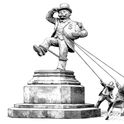In the 1830s, a story began to circulate in the US press that German had almost became the official language of the newly founded US—the motion apparently defeated by only one vote. Actually, to this day, America does not have an official language—not even English. The story— now known as the Muehlenberg legend—was mostly fabrication, but it did have a kernel of truth.
In 1794 a group of German-speaking immigrants petitioned the House of Representatives to have laws and regulations published in both English and German to facilitate integration and political participation. It was this request that was rejected 42 to 41. Some say that ironically, the decisive vote was cast by Fredrik Augustus Muhlenberg, the first German-American Speaker of the House—though records show that he diplomatically abstained. But what if there was an official language, and what if back in 1795 the US had said wir sprechen Deutsch?
The dealings of the young American republic with Europe during the first half of the 19th century were shaped mainly by negotiating their position vis-à-vis France and in relation to Britain. Prussia had a trade agreements with the US but that was about it and the Habsburg empire was looking east rather than west. There was no real German dimension to the Louisiana Purchase nor to the War of 1812—how could there have been, when Germany was not even a unified state yet? In fact, during the first half of the 19th century, by speaking German, America would probably have changed the history of central Europe more drastically than its own development at that time. After all, in the movement for unity and liberalisation, sparked by the Napoleonic Wars and culminating in the 1848 revolutions, language was a crucial ingredient for the German lands. A German-speaking republic across the sea could have provided a powerful point of reference in political debates as well as in questions of national identity.
Read more from our "what if..." series:
What if… the First World War had never happened?
What if… Lehman Brothers had not collapsed?
What if…Henry VIII had been granted a divorce?
Back in America tensions were mounting over slavery and the rift between north and south was growing deeper around the middle of the century. Had German been the official language, the large German communities of the midwest could have turned their weight into political presence and a third regional block might have diffused the situation. Furthermore, particularly in Missouri and Kansas, the strong anti-slavery sentiment among German immigrants could have made a difference during the late 1850s. These areas saw the prelude to the Civil War with violence erupting over the question of whether slavery should be allowed in states that newly joined the union. But German immigrants were not able to make their voices heard nationally—partly because their language barriers limited them to local politics.
After the Civil War and with German unification in 1871, the two nations eyed each other across the Atlantic with a mixture of rivalry and mutual fascination as they both strove to carve out their position on the world stage against the mighty British empire. However, it is unlikely that a common language would have softened this competition.
The 20th century saw the German language become closely linked to cruelty. This started in the First World War and the US passed legislation to ban German classes from schools and German music from concert halls. The anti-German sentiment was so strong at this time that dachshunds were stoned in the streets of New York. Therefore, had German been America’s national language, it might well have been abolished in 1917. On the other hand, Germany’s propaganda effort to keep America neutral could have been more effective had it been accessible to the masses. Contemporaries complained about what they saw as an unjust advantage for British propaganda due to language. Had the US stayed out of the Great War, the effect on developments in Europe and the world throughout the 20th century and beyond would have been enormous.
Today, 50m Americans claim German descent. Sometimes there is German heritage in what seems most American. Walt Disney draws heavily on German fairytales and numerous US-state hymns use German melodies. The pretzel and the hot dog and the hamburger are German imports, as are Santa Claus and the Christmas tree. Nineteenth-century German immigrants brought gymnastics clubs, kindergartens and the PhD. When Jewish-Germans and other German emigrants were forced out of their country during the Second World War, they too left their mark on American culture and society.
Philosophers of language argue that our mother tongue affects the way we see and understand the world. Would American pragmatism have worked in German? What about the particularities in the Anglo-American interpretation of freedom, liberty, republicanism or even culture? Could the world deal with a largely German-speaking movie and music business? And finally, could the “awful German language” (Mark Twain) ever be a lingua franca like English is today?
Language has always been a key feature of German nationalism and imperialism. If the US had chosen German as their official language, from early on, it would have ideologically strengthened Germany’s position in Europe—for better or worse.












